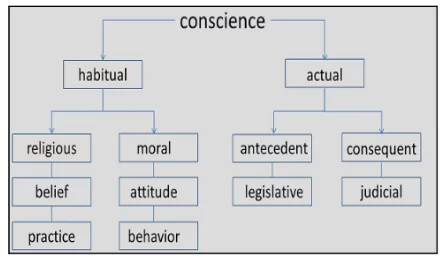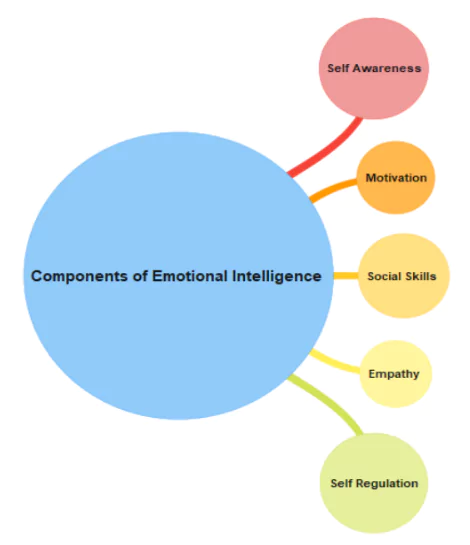Context:
This article sheds light on the ‘conscience’, voice of conscience, ‘crisis of conscience’ and its role in ethical decision making.
What is the Voice of conscience?
- Inner value system: Conscience is an inherent, unchanging, and incorruptible aspect present in every human being.
 It is like an inner voice that guides us to do what is right.
It is like an inner voice that guides us to do what is right.
- This inner voice is often called the ‘voice of conscience.’
- It shows the moral goodness and badness of an individual’s own conduct.
- Natural Phenomenon: It’s a natural part of every person and helps us make good ethical decisions.
- If someone’s values are not well-developed, their conscience may be weak. But if someone has clear and informed values, their conscience is strong and helps them distinguish right from wrong.
- Helps in taking the right decision: A person’s conscience helps them look at situations from different viewpoints and make the right choices.
- Therefore, individuals must learn to heed their conscience clearly to enhance ethical competence.
Confronting the Crisis of Conscience with Moral Resilience
- Inner Conflict: Crisis of conscience occurs when there’s an inner conflict between one’s moral compass and external pressures, leading to a difficult decision-making situation.
- This creates inner turmoil and a sense of unease, making it hard to find a resolution.
- Causes of Inner Conflict: Factors like unchecked desires and lack of self-awareness contribute to this inner struggle.
- Uncontrolled desires are more harmful than external pressures or hostile actions from others.
- Way to overcome Conflict: Moral strength and clarity: Dealing with this crisis requires immense moral strength, calmness and clarity because
- One will have to fight with oneself.
- tame one’s own noise and create a pause from within.
- Ancient Wisdom: In ancient teachings, individuals who master this inner conflict are described as ‘Arihant,’ meaning the ‘destroyers of real enemies.’
- This highlights the importance of self-awareness and moral strength in navigating such challenges.
Need of conscience keeper
- A conscience keeper is someone who plays a crucial role in guiding and safeguarding an individual’s ethical decisions. A conscience keeper, such as C. Rajagopalachari to Mahatma Gandhi or the judiciary as guardians of the Constitution, offers moral guidance and clarity.
- Their presence helps individuals uphold ethical principles and make principled decisions.
Guardians of Governance: The Crucial Role of Conscience Keepers in Democracy
- Understanding the Importance of Role Clarity: In a democratic setup, where the executive branch holds significant influence over citizens’ lives, it’s essential for officials to fully comprehend their roles and duties.
- This understanding helps prevent a crisis of conscience and ensures effective governance.
- Minimising Crisis of Governance: A crisis of governance arises when officials fail to adhere to their conscience, eroding public trust and causing a breakdown in decision-making processes.
 This lack of moral integrity leads to a reluctance to accept responsibility for failures or impasses in governance. This is the point where the conscience keeper helps to guide officials to tackle situations effectively.
This lack of moral integrity leads to a reluctance to accept responsibility for failures or impasses in governance. This is the point where the conscience keeper helps to guide officials to tackle situations effectively.
- To resolve Challenges Faced by Bureaucrats: Citizens often turn to bureaucrats in times of trouble, expecting them to empathize and address their concerns.
- This places bureaucrats in a dilemma, causing a crisis of conscience as they navigate personal and professional responsibilities.
- Navigating Crises with Inner Development: Conscience keeper helps in inner development of the individuals as successfully managing crises requires individuals to cultivate inner growth and emotional intelligence.
- By minimising internal conflicts, officials can better handle external interpersonal challenges.
The Moral Compass: Conscience’s Vital Role in Ethical Decision-Making
- Facilitates Decision Making: Conscience helps in taking good decisions when an ethical dilemma arises in a given situation.
For Example: A small boy stole bread (due to hunger) from a store and broke its glass while running but he was caught by its owner. Now, if the owner files a case against the boy for his loss (Glass), the official may face an ethical dilemma. A dilemma between punishment for loss and stealing for hunger. In such a situation, it is the conscience that guides officials in taking the right decision.
- Develop analytic perspective: Conscience helps individuals in understanding a given situation from various perspectives.
- Conflicts of interest: It helps in removing conflict of interest and shows a way for taking the right decision based on the given circumstances.
News Source: Indianexpress
![]() 4 Mar 2024
4 Mar 2024
 It is like an inner voice that guides us to do what is right.
It is like an inner voice that guides us to do what is right.
 This lack of moral integrity leads to a reluctance to accept responsibility for failures or impasses in governance. This is the point where the conscience keeper helps to guide officials to tackle situations effectively.
This lack of moral integrity leads to a reluctance to accept responsibility for failures or impasses in governance. This is the point where the conscience keeper helps to guide officials to tackle situations effectively.